5 Ridiculous Lies You Believe About Ancient Civilizations
Since not all of us decided to tell our parents we'd be moving back home in four years by majoring in classics, much of what we know about ancient Greece and Rome tends to come from films and TV -- meaning that much of what we "know" originated with some Hollywood producer saying, "Yes, but can we make the togas sexier?"
For example, you probably think that ...
The Romans Were Orgy-Crazed
The Myth:
Quick, let's do a word association. When we say "Roman," you say "orgy!" Some of you might have said "empire." That's also correct, but for the purposes of this introduction, you said "orgy," goddammit, because we all know the Romans were like human rabbits -- all humping, all the time, and also they had abnormally long ears and pooped little round pellets.

The Reality:
Here's why you should never get your history lessons from a film produced by Penthouse : It appears the stories of Roman sex festivals were mostly the result of nasty rumors made up after the fact. Or awesome rumors, depends on where you're coming from. The reality is the ancient Romans actually went to insane lengths to have the exact opposite of orgies. We're talking prudery to the highest degree -- couples had sex at night, in complete darkness, and with most of their clothes on. Sure, wealthy Romans had sex in front of their servants, but to them house servants were like furniture that could bring you stuff.
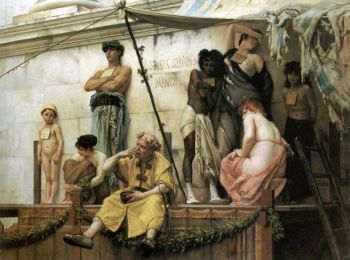
As it turns out, the Romans had trouble even imagining an orgy. In one of our favorite Hercules myths, our refractory-period-free hero deflowers all 50 daughters of a Greek king in a single night. In keeping with the times, though, the king sent one daughter in at a time. One in, one out, just like a nightclub ... where your father's the doorman, and also the guy who pimps you out to get all inseminated up with a half-god's "li'l heroes."
But if the movie Caligula isn't as accurate as we'd hoped, who invented the Roman orgy? Early Christians, that's who. Christian proselytizers knew their audience, and nothing stirs up the blood of an entire culture of super-prudes like the idea that somewhere, someone is having sex differently from everybody else. So, to promote their nascent religion to the Roman masses, early Christian writers crafted lurid tales of debauchery that were "Hey, no kidding, totally happening -- but only at those rich guys' houses." In a culture that celebrated solemnity and virtue, nothing defamed the traditional religion of the day like being associated with well-lit nudity and sex parties.

The Christian marketing pitch essentially boiled down to: "See those pagans with their orgies, and their different positions -- they take their clothes off for sex! Gross, right? Now, let me tell you all about Jesus ..." And something tells us it totally worked. (That something being the four Christian churches we can see from where we're sitting right now.)
Ancient Rome Was Lily White

The Myth:
If we asked you to picture a coliseum full of ancient Romans, chances are you'd picture a sea of red mohawk helmets. And beneath those helmets? Scads of white, European-looking fellows in togas.
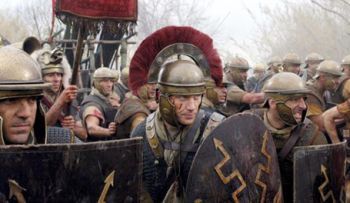
It's not that you're racist. It's that almost every filmmaker in cinematic history has made that same assumption about the ancient Romans, with logic along the lines of: "Rome's in Europe. Europe's white-ish, so ancient Romans were white-ish." What difference could 2,000 years possibly make?"
The Reality:
Here's a picture of the Roman Empire. Notice that a goodly chunk of the empire is in what some might refer to as "Africa" or "the Middle East."
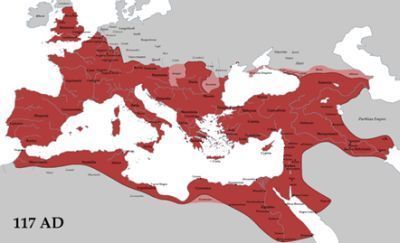
Based on that alone, it should be pretty obvious that Romans would've been a bit tanner than we tend to imagine. The Roman Empire would have been a pretty colorful place, considering it was a mix of North African, Semitic, West Asian, Latin, and Greek peoples -- although you'd never know it from modern cinema.
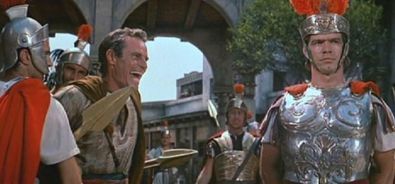
But despite Hollywood's near-complete refusal to acknowledge it, ancient Rome was the original melting pot. See, back then, color and prejudice weren't linked -- unlike racism and stupidity today. Rome even had at least two African emperors, Severus and Macrinus. Rome was unique in the ancient world for its inclusive citizenship. In the past, a city-state like Sparta might have conquered a people and enslaved or slaughtered them all. Rome, on the other hand, blew ancient people's minds by assimilating or even naturalizing the conquered. The ancient Romans didn't even force conquered peoples to give up their own languages or customs.
The important thing for the Romans was that people followed the law, paid taxes, and, oh yeah, fought in the Roman army. The Romans were no dummies: Little old Rome was never going to be able to populate the world it conquered, let alone defend it, so absorbing other peoples like a giant legionary sponge was the only way to keep enough bodies in the military and on its farms. Rome enrolled northwest Africans, Moors, Gauls, Celts, Jews -- pretty much anyone who could swing a sword or throw a spear -- which is how an Ethiopian soldier could find himself fighting in Britain (maybe that's why every film Roman speaks with a British accent).
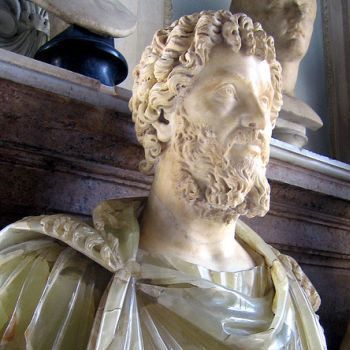
There are no exact numbers on ancient Roman diversity, but given Rome's constant contact with Africa and the Near East, the coliseum we asked you to imagine earlier should look more like Ellis Island and less like a Dave Matthews Band concert.
Christians Were Fed to Lions and Martyred in the Colosseum

The Myth:
Whenever the ancient Romans needed more trident-stabbing fodder for the pleasure dome's gladiators or more kibble for the Colosseum's big cats, Roman authorities simply rounded up another group of Christians and herded them into the arena. Reserve your seats now! Bring the kids!
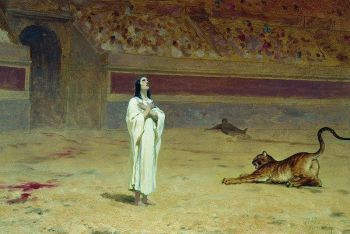
The Reality:
There are zero authentic accounts of Christian martyrdom in the Colosseum until over a century after Christianity became the official religion of the Roman Empire. In fact, not a single legitimate record exists of the Romans executing any Christians in the Colosseum. Zip. Zilch. Nada.
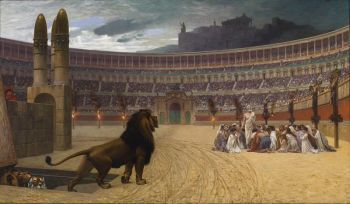
But how do we know not one lion picked his teeth with the bones of a faithful believer in the Colosseum? Because back when Emperor Nero was busily persecuting early Christians as arsonists, the Colosseum hadn't even been built yet. And by the time construction was completed decades later, Imperial Rome had reverted back to its standard policy of "Jesus, Yahweh, Zeus -- whatever, just pay your taxes, K?"
But there's an entire tradition of martyrs, saints, and apostles who were eaten by lions, burned at the stake, or murdered to appease the crowds of the Colosseum! So where did all those pleasant bedtime stories come from? Brace yourself for a touch of deja vu, because the short answer is: early Christian writers.
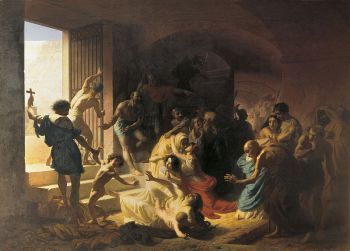
In the second century A.D., a whole new genre of fiction cropped up. The "Martyr Acts" were stories about the church's beginnings, when heroic men and women professed their faith in spite of terrible torture and suffering. This "sacred pornography of cruelty" was hugely popular -- if you were a literate Christian living in Imperial Rome, the Martyr Acts were your Harry Potter. With symbolism even less subtle than Dan Brown's novels, the Martyr Acts told stories of good and pure Christians being trampled to death or decapitated by violent Roman officials. The Martyr Acts satisfied the desire of early Christians to: 1) read faith-affirming literature filled with heroes exemplifying pacifism, love, and forgiveness and 2) read faith-affirming literature overflowing with the violence, death, and destruction that made a story readable to Romans.
Instead of blaming the Christian writers for creating a millennium's worth of misconceptions, though, we should really be thanking those guys for helping to preserve a historic landmark. That's because, starting in the 18th century, various popes used this spurious history to declare the Colosseum a site sanctified with the blood of martyrs in order to stave off its destruction.
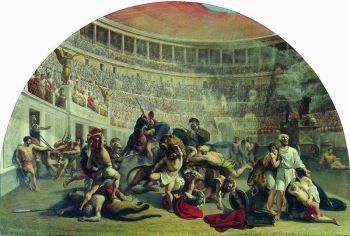
The Ancient Olympics Were About Tests of Physical Ability, Not Endorsements and Fame
The Myth:
Sure, today's Olympics are corrupt, rife with cheating, and riddled with scandal, but at least today's games aspire to the noble ideals of the ancient Greeks -- amateurism, fair play, and peace. For one brief moment in history, those cherished virtues were upheld. It's inspiring stuff, really.
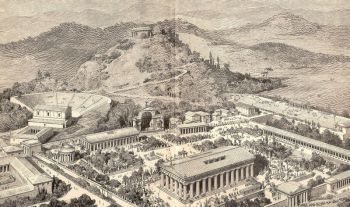
The Reality:
Literally all the worst aspects of the modern games -- cheating, corruption, commercialism -- were present almost from the very beginning of the ancient Olympiad. Hell, the ancient Greeks couldn't even pay lip service to the spirit of sportsmanship, because the idea of "fair play" didn't even exist. And that other righteous Olympic ideal, amateurism? There was no place for that shit in the ancient Greek games -- not with "riches and bitches" (we're fairly certain that's an ancient phrase) up for grabs.
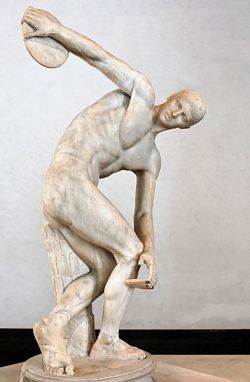
"For love of the game" certainly didn't exist two millennia ago. Ancient Greek athletes were just as motivated by material gain and glory as today's -- hell, the word "athlete" even means "one who competes for a prize." Technically, the Olympiad itself only awarded its victors laurels and olive wreaths ... but, bring home some of those laurels and prepare to be showered with the aforementioned riches and bitches. The city of Athens paid its Olympic winners literal fortunes. Pensions for Olympic athletes were common, too, with some athletes winning free meals for the rest of their lives -- which was a big deal in a time when a huge chunk of the population was subsistence farming. Popular winners were paid to make public appearances and attend other games, and appearance money was serious dough: Unlike the loose change ex-Real Worlders collect to show up at bar openings, a great athlete might make a hundred times the annual salary of a soldier for a single day's appearance.
Naturally, with political appointments, wealth, personal statues, and celebrity on the line, performance enhancement was a given and cheating was bound to happen. Athletes attempted spells, potions, herbs, oils, and alcohol. Even if the benefits were somewhat ... ethereal, the desire to get one over on competitors was very much real. Also, the ancient Olympics elevated cheating to an art form -- mostly because the punishments ranged from flogging to death. Despite the risks, athletes bribed judges and competitors, and as the Olympics progressed, various events could all be had for not-so-reasonable prices.
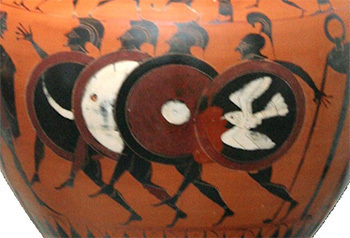
At least the ancient host city never changed, which meant no host city selection committee scandals. Instead of fighting to have their city host the games, ancient Greeks simply fought for control over the one city that did host the games, Elis. Just like today, hosting games meant profits from tens of thousands of spectators and hundreds of vendors jostling for the right to sell their kebabs, tchotchkes, and poorly made souvenirs. The ancient games were just as highly commercialized as today's Olympics, although as far as we know the ancient Greeks went several centuries without a single sperm-shaped mascot.

Ancient Greece Was a Progressive Beacon of Reason

The Myth:
Before the Roman Empire came along and conquered the world, reason, logic, and civility ruled in ancient Greece, where during any random late-night beer run you could run into Aristotle and Plato in line at the cash register. The whole country was a liberal arts major's wet dream. Truly, the era was a golden age for humanity.
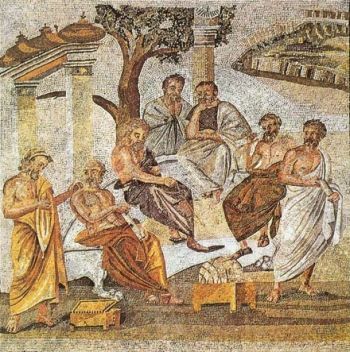
The Reality:
Ancient Greece resembled a modern-day sectarian war zone with constantly warring bands. That's not to say there weren't bright spots, or that Western culture doesn't owe a great deal to said bright spots -- we'd just like to remind you that the ancient Greeks exiled, lynched, or executed some of the brighter among them. Ever heard of a guy named Socrates? Yep, executed.

See, the Greece of popular imagination never actually existed, because there was no one "Greece." The Hellenic peninsula was home to over 1,000 city-states. And ancient Greeks identified with their city-state like patriotic gang members. Also, each gang had its own armies, governments, customs, and religions. Oh, and they all had slaves -- enough slaves to make the antebellum South seem downright forward-thinking by comparison. Because for all that talk about lofty ideas like freedom and democracy, the ancient Greeks possessed no qualms about enslaving their fellow man. Sure, some philosophers said enslaving fellow Greeks wasn't super cool, but then city-states like Sparta and Thessaly told them to take their philosophy and get bent by enslaving the entire populations of other city-states.
Oh, and freedom-loving, democratic Athens had more slaves than anybody. And while we're on the subject of the only democratic city-state, now's probably a good time to mention that democracy lasted in Athens for less than two centuries. Almost every ancient leading mind couldn't wait to return to tyranny, or literally any form of government other than democracy. Plato and Socrates weren't buying it, while Aristotle's shining defense for it was simply that it didn't suck quite as hard as other governments.
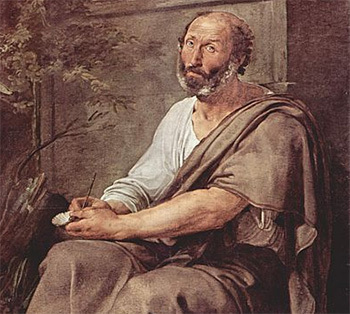
So, while philosophical and cultural achievements were made in ancient Greece, they didn't spread too quickly or too far. Constant warfare and rivalry between city-states was only one impediment. The other? Less than 5 percent of those living in ancient Greece were literate. Most Greeks weren't the urban intellectuals of popular imagination; they were rural farmers and herders who most likely never ventured beyond their own city-state.
See, part of the problem is that we interpret the ancient Greeks through the works and words of those who were most prominent ... and those who were most prominent also happened to be their most exceptional minds. But the average ancient sheepherder didn't give two shits about logic, literature, or the theater -- he was too busy being a sheepherder who preferred the comfort and familiarity of superstition. So, expounding that situation to modern society, we can safely assume that in 2,000 years some future culture will be trying to construct an accurate picture of the U.S. based solely off of reality TV and superhero movies. And that picture will be awesome.

You can also find J. scribbling away about mercenaries, militaries, and all things generally history here.
Related Reading: Trust us, you buy into PLENTY of other myths about the ancient world. For example, the samurai's ancient bushido code only dates back to 1905. And yoga, that supposedly millennia-old stretchercise so beloved by hippies, only came about in 1960. Once you've read all that, feel free to reverse gears and check out our article on real ancient buildings much too advanced for their time.
We have some bad news: Marie Antoinette never said that thing you think she said, Guy Fawkes was not a badass anarchist and your favorite book sellers are now taking pre-orders for a text book written and illustrated entirely by the Cracked team! Hitting shelves in October, Cracked's De-Textbook is a fully-illustrated, systematic deconstruction of all of the bullshit you learned in school.

It's loaded with facts about history, your body, and the world around you that your teachers didn't want you to know. And as a bonus? We've also included the kinkiest sex acts ever described in the Bible.







